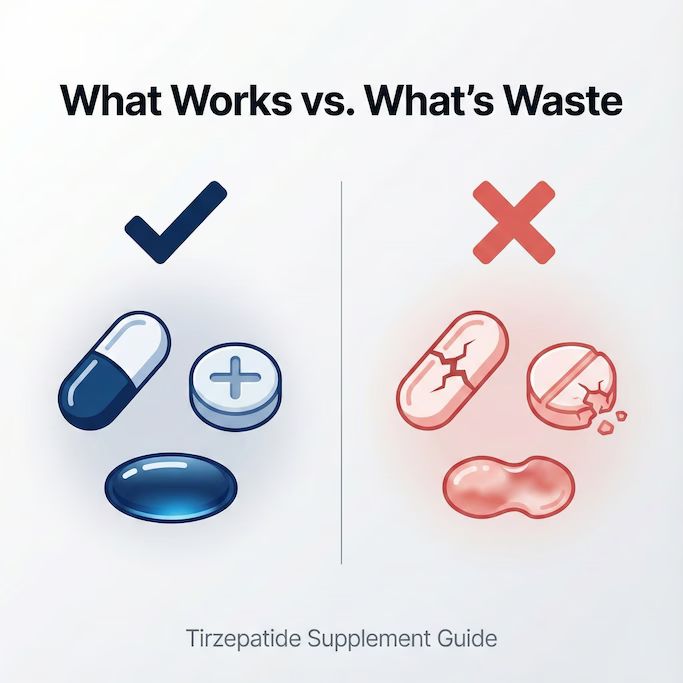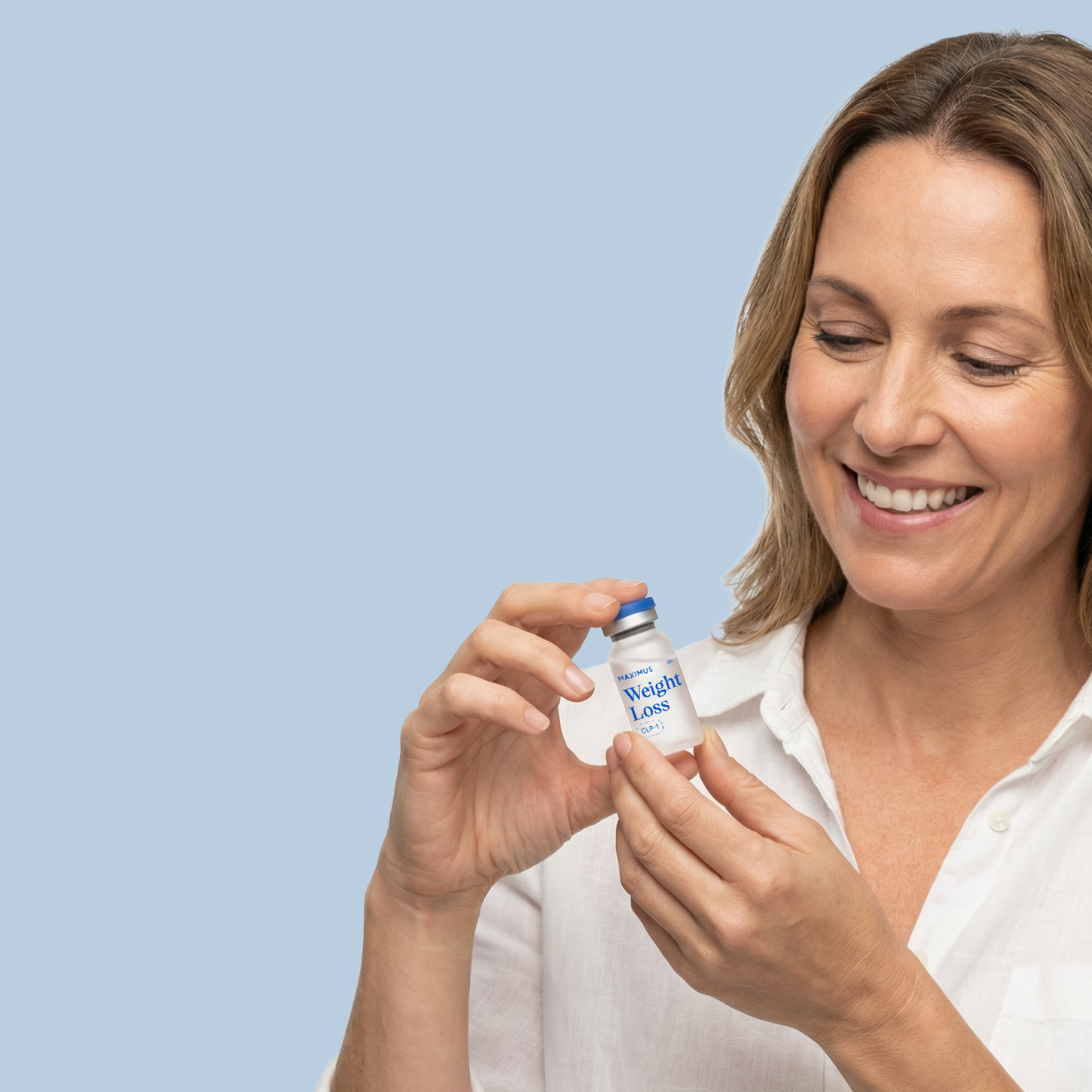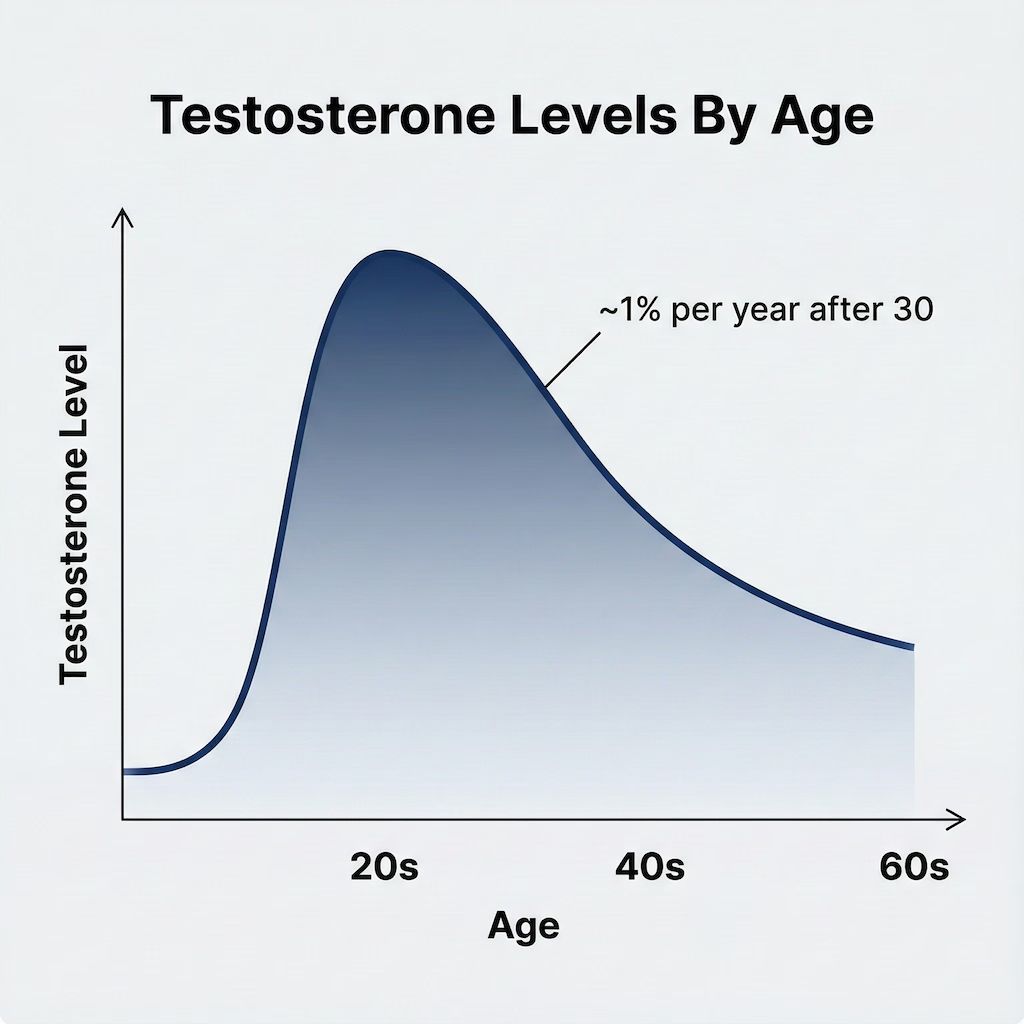Introduction
Pregnenolone is a steroid hormone precursor, which means it helps your body make key hormones like DHEA, testosterone, and progesterone. Though pregnenolone occurs naturally in the body, many men turn to supplementation if they suspect their levels are low, resulting in symptoms like low libido, depression, fatigue, impaired memory, loss of bone density, and decreased muscle mass. Like testosterone, pregnenolone also decreases with age and both hormones are lower in overweight and obese men compared with men with a normal BMI. In addition to balancing out your hormone levels, other benefits of pregnenolone include enhanced cognitive function and better mood. Some may even take pregnenolone alongside other testosterone boosters to improve the efficacy of their current regimen.
Read on to find out what pregnenolone is, how it interacts with testosterone, and whether you should add a hormone precursor to your routine.
Key takeaways:
- Pregnenolone is a steroid hormone precursor, which helps your body produce DHEA, testosterone, progesterone, estrogen, and cortisol.
- Pregnenolone also has powerful anti-inflammatory properties and is a sigma-1 receptor agonist, leading to enhanced memory and learning, improved mood, and neuroprotection.
- Taken as a supplement, pregnenolone may increase testosterone levels, along with all other steroid hormones in the body. As the benefits are dose-dependent, it is recommended to consult your doctor first to secure the right dose.
Pregnenolone: The Mother of All Hormones
Primarily produced in the brain, gonads, and adrenal glands, pregnenolone is a steroid hormone precursor synthesized from cholesterol. Pregnenolone is sometimes referred to as the “mother of all hormones” because it is needed to create all steroid hormones, including DHEA, testosterone, progesterone, estrogen, and cortisol.
In addition to serving as the precursor for other steroid hormones, pregnenolone also has powerful anti-inflammatory properties, which have been shown to significantly relieve pain in some research. Additionally, pregnenolone and its metabolic derivatives have beneficial effects in the brain as a sigma-1 receptor agonist. This includes enhancing memory and learning, reversing depressive disorders, and modulating cognitive functions. Researchers have noticed a link between decreased levels of pregnenolone and neuroinflammatory diseases, which reiterates its role in neuroprotection and neuroregeneration.
Testosterone: More Than Just a Sex Hormone
Testosterone is the primary male hormone and plays a significant role in spermatogenesis, regulating your libido, and fertility. It is also responsible for the development of male characteristics like a deeper voice, penis size, and body hair. Produced mainly in the testes and in small quantities in the adrenal glands, testosterone is also produced in female bodies, though at much lower levels.
But testosterone is much more than just a sex hormone. It also affects your mood, muscle mass, strength, and your energy levels. The hormone also signals your body to create new red blood cells. Low testosterone may be a sign of a bigger issue like low thyroid function or a problem with glands that control hormone function, while too-high testosterone levels are associated with a higher risk of prostate cancer. Because of these far-reaching implications, maintaining healthy testosterone levels is essential not just for your sexual health, but your overall mental and physical health.
There’s no one-size-fits-all number for what your testosterone levels should be, but there are some indicators that you can use a boost. Signs of low testosterone levels include:
- Decreased libido
- Fatigue
- Reduced lean muscle mass
- Irritability
- Trouble getting or maintaining an erection
- Depression
- Hair loss
- Bone loss
- Poor memory
- Low sperm count
While many people turn to testosterone replacement therapy (TRT) to increase their testosterone levels, there are a number of side effects to consider first. These include decreased sperm count and quality, testicular shrinkage, and cardiovascular issues. Finding ways to help your body make more of its own testosterone, either through lifestyle changes, medication, or supplementation, may help you avoid such side effects. Read on to find out how pregnenolone and testosterone are connected to see if supplementing with this mother hormone can work for you.
Pregnenolone and Testosterone: A Vital Connection
Pregnenolone can be thought of as a building block for testosterone. Research indicates that the synthesis of testicular steroid hormones involves the mitochondria, where pregnenolone is produced and then converted into testosterone. Total testosterone then travels in the blood mainly bound to proteins, and a small portion circulates as free testosterone.
Alterations to the synthesis of pregnenolone have been shown to have a downstream impact on the levels of other steroid hormones, which include testosterone as well as estrogen. Studies have also shown that pregnenolone influences sperm function, suggesting that low pregnenolone production may have direct consequences on reproductive health.
The Impact of Pregnenolone Supplementation on Testosterone Levels
Does pregnenolone increase testosterone? It does appear that supplementing with pregnenolone is one way to indirectly increase testosterone levels, but only if you get the dosage right. Its effects have exhibited an inverted U-shaped curve with positive effects for the optimal doses and lower performance at higher doses. Taking a low dose is recommended, especially if you are already taking another medication or supplement known to increase testosterone.
Pregnenolone supplementation can also impact your testosterone levels by improving sleep. Studies show pregnenolone increases the time spent in slow wave sleep (the deepest sleep stage) while impacting GABAA receptors in the brain. This stage of sleep is crucial to testosterone production, as research has shown a correlation between suppressed slow wave sleep and lower testosterone levels.
But while taking a pregnenolone supplement may increase the production of testosterone, it’s important to remember it will also increase the production of all other steroid hormones, including estrogen. This is an entirely different approach than a medication like enclomiphene, which blocks estrogen from binding to the estrogen receptor in the brain, tricking the body into thinking it’s not getting enough. This stimulates the production of the hormones LH and FSH, which signals the testes to make more testosterone and sperm.It is possible that taking a low dosage of pregnenolone for men alongside enclomiphene may enhance the testosterone-boosting effects of the medication, but more research is needed to ensure the full range of benefits.
Safety and Side Effects
One study of pregnenolone supplementation ranging from 50 mg to 250 mg twice daily, found potential side effects to include tiredness, diarrhea and depressive symptoms. In another study, adverse effects included a corneal ulceration due to contact lens abrasions, a skin abscess followed by an allergic reaction to the antibiotics used to treat it, skin rash on upper back, and sinusitis; dosage in this study was 500 mg per day.
If you are taking a high dose of pregnenolone alongside testosterone replacement therapy, estrogen therapy, or progesterone therapy, there is a chance that a hormonal imbalance may occur, which is why hormone supplementation should always be approved and monitored by your doctor.
The bottom line: Pregnenolone supplementation may increase testosterone levels, along with all other steroid hormones in the body.
As a steroid hormone precursor, pregnenolone may give your body the boost it needs to increase testosterone, along with progesterone, estrogen, and cortisol. When dosed correctly, pregnenolone can help improve mood, enhance cognitive function, and potentially increase the efficacy of your testosterone-boosting regimen.
Always consult your doctor first before adding pregnenolone to your routine, especially if you are already taking other medications or supplements, as the wrong dose may lead to a hormonal imbalance.
Disclaimer: The contents of this article, including, but not limited to, text, graphics, images, and other information, is for information purposes only and does not constitute medical advice. The information contained herein is not a substitute for and should never be relied upon for professional medical advice. The content is not meant to be complete or exhaustive or to be applicable to any specific individual's medical condition. You should consult a licensed healthcare professional before starting any health protocol and seek the advice of your physician or other medical professional if you have questions or concerns about a medical condition. Always talk to your doctor about the risks and benefits of any treatment. Never disregard or delay seeking professional medical advice or treatment because of something you have read on this site. Maximus does not recommend, endorse, or make any representation about the efficacy, appropriateness, or suitability of any specific test, products, procedures, treatments, services, opinions, healthcare providers or other information contained herein. Maximus is not responsible for, nor will they bear any liability for, the content provided herein or any actions or outcomes resulting from or related to its use.





